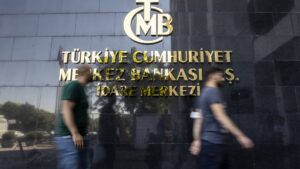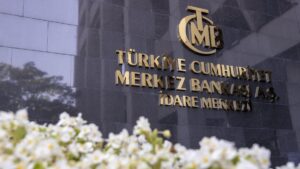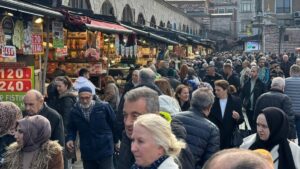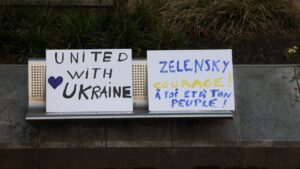The Trade Ministry on Friday said it had imposed fines over hikes of rental and sales prices in real estate following this week’s earthquake in Istanbul, amid calls for strict oversight to counter profiteering.
The magnitude 6.2 tremor that rattled the Turkish metropolis on Wednesday sent citizens dashing from shaking homes, reviving memories of a historic quake that devastated the country’s southeast two years ago.
There were no deaths from Wednesday’s quake, the biggest in years in Istanbul, which sits just north of a fault line crossing the Marmara Sea. Some 5 million of the city’s 16 million residents live in risky homes, data showed in 2023.
Many residents sought to find new, earthquake-resistant homes, while others rushed to leave the city to stay with relatives elsewhere.
Seizing on the panic, opportunists reportedly hiked prices dramatically.
The Trade Ministry said it had imposed administrative fines totaling TL 14.5 million (about $380,000) on individuals who it says had increased rental and sales prices on real estate listings following the tremor.
“We will continue to monitor developments in the real estate sector and take preventive measures against exploitative practices that harm citizens,” the ministry said in a statement.
Environment, Urbanization and Climate Change Minister Murat Kurum said about a third of the 1.5 million buildings in Istanbul deemed at risk “require urgent transformation – and we have no time to lose.”
February 2023’s 7.8-magnitude earthquake was the deadliest and most destructive in Türkiye’s modern history, killing more than 50,000 people in the south and leaving hundreds of thousands displaced.
The latest tremor also revived memories of a 1999 quake that killed 17,000 near Istanbul, Europe’s largest city, which also spans across the Bosporus into Asia.
Sharp hikes
The Consumer Association of Türkiye (TÜDER) on Friday urged authorities to intensify oversight to counter profiteering, particularly in the housing and intercity bus sectors.
The association has received numerous complaints about excessive price increases, especially in newer buildings and areas with stronger ground conditions, TÜDER Chair Levent Küçük said.
“Reports show sharp increases in both rental and sale prices for properties in newly built and geologically stable areas,” Küçük told Anadolu Agency (AA).
“This is clear earthquake profiteering. We absolutely do not accept this behavior. While a moderate price rise in response to limited supply might be understandable, using the disaster as a means to inflate prices beyond market norms is unacceptable and should not be tolerated.”
Küçük urged the Trade Ministry to take strong action and emphasized the responsibility of professional bodies such as the chambers of realtors and the chambers of commerce.
“These organizations must help prevent unethical practices by disciplining members who engage in price gouging and by warning or inspecting real estate firms that act in bad faith,” he said.
‘Stay vigilant’
Küçük also advised the public to remain calm and cautious in the aftermath of the quake.
“Everyone is understandably scared and wants to live in safer buildings. But we must not fall into the trap of unethical sellers during this panic,” he said, adding that residents should wait for markets to stabilize and reflect true values.
He encouraged consumers to report unjustified price hikes, particularly from real estate agents or sellers, to the Trade Ministry, provincial trade directorates, or relevant professional chambers.
“If you know the previous and current prices of a property – whether for rent or sale – report it with that data,” Küçük added.
Some prices double, some triple
Küçük noted that the association had received the most complaints regarding housing prices and bus tickets, some of which had reportedly tripled in price.
“We’ve seen more than 100% increases in housing prices and up to three-fold rises in bus ticket fares,” he said. “So far, we haven’t received complaints regarding emergency goods like tents, power banks, or blankets. However, we’ve heard concerns from citizens about GSM operators.”
Küçük called on telecom providers to prioritize infrastructure investments to prevent disruptions during disasters.
“In times like these, communication is critical. We urge operators to strengthen their networks, but we also ask citizens to avoid overwhelming the systems in panic. Internet-based communication tools should be preferred when possible,” he said.




















































Be First to Comment